
Strap yourselves in! This is going to be a long post…
For the past three months, I lived with a secret. In late February, I was appointed a judge for the Western Australia Premier’s Book Awards but was not allowed to tell anyone until the winners were announced. Last night was the award ceremony at the State Library of Western Australia, so I’m free to shout it to the world now!
I was a primary judge for the Book of the Year, open to all genres, fiction and non-fiction and worth $15,000 to the winner, and a secondary judge for the Writer’s Fellowship, designed to assist a Western Australian writer of any genre, to develop their writing practice and give them the time to create new work, worth $60,000.
The WA Premier’s Book Awards are unique among Australian premier’s awards from other states because entrants must have lived in Western Australia for at least 12 months before the nomination deadline. In other words, it’s a book prize for writers exclusively from Western Australia, chiming nicely with my ongoing Focus on WA writers project!
Additionally, these awards are billed as book awards, not literary awards — make of that what you will.
Premier’s Prize for Book of the Year
For around five weeks in March and April^^, I and two fellow judges whittled down three boxes of books (left) to a really strong shortlist of five (right). It was no mean feat, given the entrants’ quality (and number) and the fact that we were comparing non-fiction with fiction and poetry. However, a strong list of contenders quickly emerged, all meeting the criteria of outstanding writing and content, originality in their chosen genre or genres, and a substantial, distinctive contribution to writing.

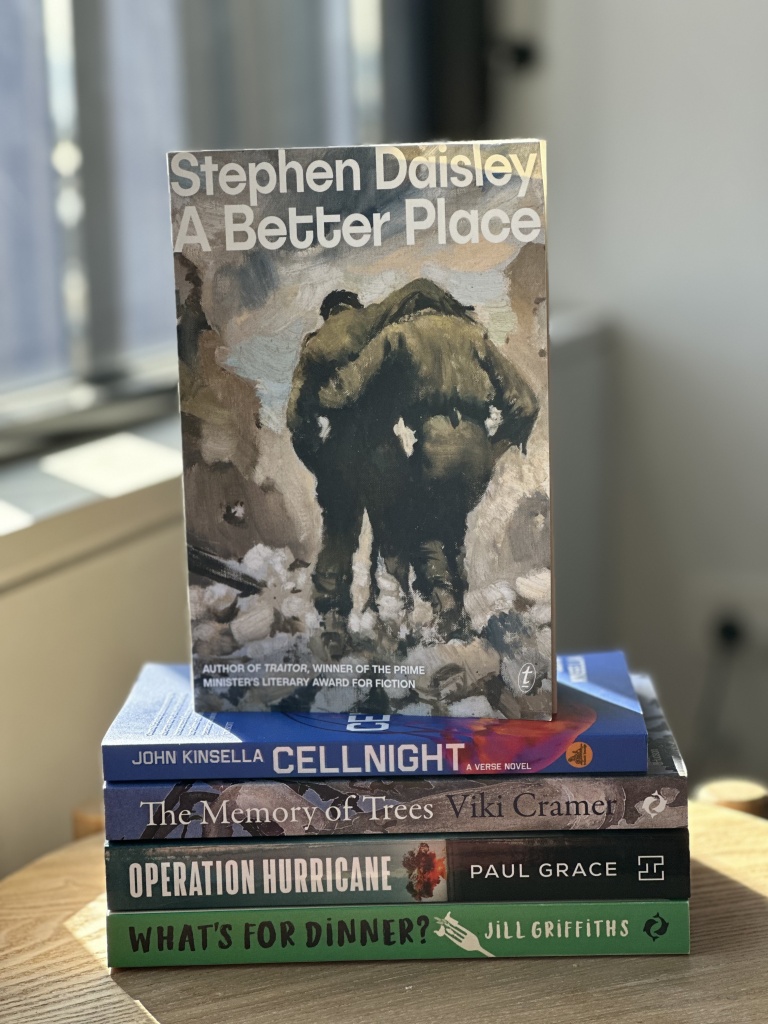
The resultant Book of the Year shortlist was a diverse cross-section of exemplary writing from across the state. It comprised a literary novel, a verse novel and three non-fiction titles (about WA trees, atomic testing on the Montebello Islands in the 1950s and food production, respectively).
I can honestly say that any one of these books would have been a worthy winner, but in the end we chose Stephen Daisley’s extraordinary war novel, A Better Place, which turns the ANZAC legend on its head and provides a gripping and visceral account of two brothers separated on the battlefields of World War II.
I compiled the judging notes for each book and quote them verbatim here:
A Better Place by Stephen Daisley | Text Publishing (WINNER)
An extraordinarily powerful novel follows twin brothers from rural New Zealand separated on the battlefields of World War II. Using short, sharp prose, it creates a visceral and suspenseful read, vividly depicting the violence and chaos of war while contrasting it with moments of love and tenderness among soldiers. It neither glorifies war, nor shies away from the horror. The narrative re-examines the ANZAC legend, questioning the morality of soldiers’ actions. The story’s emotional depth leaves a lasting impact, balancing horror with hope and capturing the reader’s heart. It’s a masterful work of fiction, faultlessly written and profoundly moving.
Cellnight: A verse novel by John Kinsella | Transit Lounge
This bold and ambitious verse novel intertwines the controversial visit of the US Navy’s Seventh Fleet to Fremantle in the early 1980s (when the Cold War was at its height) with an aboriginal death in custody. John Kinsella fuses sonnets with vivid storytelling to explore anti-nuclear protests, systemic racism, politics and environmentalism. His use of poetic form and stunning imagery creates a narrative that demands multiple readings to fully appreciate its depth. The book’s blend of historical issues and social commentary makes it a truly original work, showcasing Kinsella’s masterful ability to bring these themes to life in a powerful and accessible way. (Note, I’ve previously reviewed this title here.)
The Memory of Trees by Viki Cramer | Thames & Hudson
A heartfelt tribute to Western Australia’s eucalyptus forests blends personal experience with scientific insight, exploring the relationship between humans and trees. The author details how logging, land clearing, mining and climate change have imperilled these botanically rich forests. While the situation is dire, the book offers hope through collaborations between Western science and First Nations knowledge. Combining factual ecological information with the author’s personal reflections, this work is both informative and inspiring, urging readers to become more environmentally conscious. It is a moving and impactful examination of our most important flora.
Operation Hurricane by Paul Grace | Hachette Australia
Operation Hurricane is a fascinating and meticulously researched account of Britain’s first atomic test in Australia, conducted on the Montebello Islands in 1952. It offers a uniquely Australian perspective, detailing the operation’s political, social and environmental impacts, including effects on Commonwealth soldiers, airmen and civilians. Paul Grace masterfully brings the controversial operation to life through detailed research and a narrative that reads like a well-plotted novel. His engaging style, extensive use of archival material and personal interviews make this a riveting and eye-opening account of a pivotal moment in history, a triumph of storytelling and editorial prowess.
What’s for Dinner? by Jill Griffiths | Thames & Hudson
Compelling narrative non-fiction which delves into the history and science of our food supply chains, focusing on the plant and animal species that dominate our diets. It examines the impact of climate change and technological advances on food production, offering an Australian perspective on how food reaches our supermarkets. Masterfully written, the book balances extensive research with readability, making complex topics accessible. It doesn’t tell readers what to think but encourages them to reflect on their consumption choices and the processes behind them, providing a nuanced and engaging analysis of an essential subject.
Other award categories
Premier’s Prize for an Emerging Writer
- I am the Mau & Other stories by Chemutai Glasheen
- The Map of William by William Thomas (WINNER)
- Old Boy by Georgia Tree
- Salt River Road by Molly Schmidt
- The Things We Live With by Gemma Nisbet
Premier’s Prize for Children’s Book of the Year
- City of Light written by Julia Lawrenson, illustrated by Heather Potter and Mark Jackson
- The Eerie Excavation: An Alice England Mystery by Ash Harrier
- A Friend for George written and illustrated by Gabriel Evans
- Scout and the Rescue Dogs by Dianne Walter (WINNER)
- Our Country: Where History Happened written by Mark Greenwood, illustrated by Frane Lessac
The Daisy Utemorrah Award for Unpublished Indigenous Junior and Young Adult Fiction
- Acacia: 6 Eyes on Yesterday by Dr Stephen Hagan
- Brothers in Arms by Maureen Glover
- Underneath the Surface by Elise Thornthwaite
- Dusty Tracks by Marly & Linda Wells (WINNER)
Western Australian Writer’s Fellowship
- Lucy Dougan
- Alan Fyfe
- Kylie Howarth (WINNER)
- Laurie Steed
- Emma Young
Hall of Fame
At last night’s ceremony, two leading and well-established Western Australian writers were inducted into the prestigious Western Australian Writers Hall of Fame.
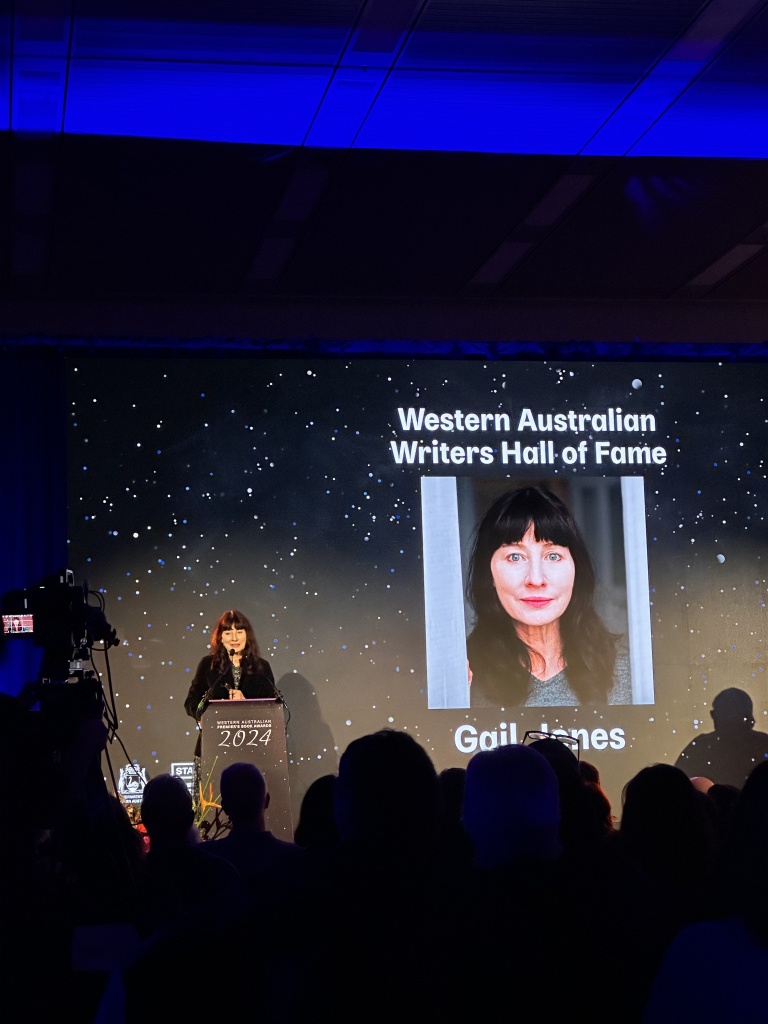
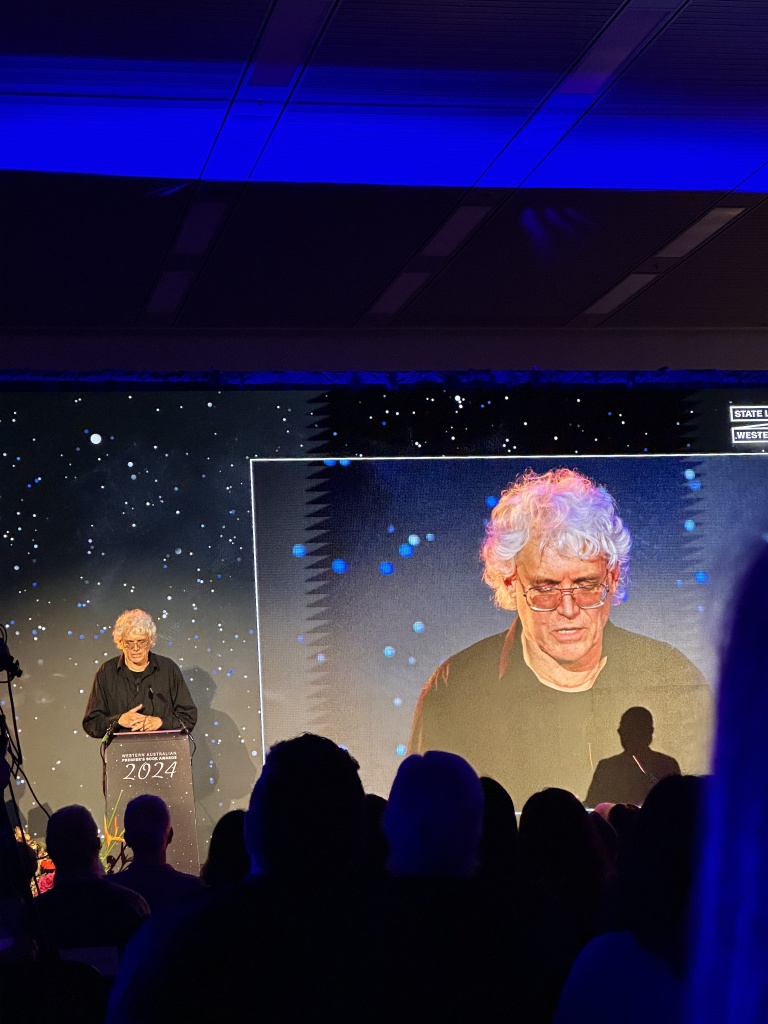
It was such a great pleasure to be in the room when Gail Jones, currently Emeritus Professor at Western Sydney University, was announced as an inductee. She is one of my favourite writers and gave an impassioned and thoughtful speech.
She is the author of ten critically acclaimed novels, many of which I have reviewed here.
Poet John Kinsella, who teaches at Curtin University, was also named as an inductee (alongside his shortlisting for the Book of the Year prize). John’s work is strongly influenced by the Western Australian landscape, as well as nature, politics, identity, social justice and colonisation. His speech was similarly passionate and insightful.
Overall, it was an amazing ceremony, and it was lovely to see the winners’ faces when they were named and called up onto the stage.
Stephen Daisley is such a quietly spoken and humble man that he couldn’t bring himself to say very much at all about his win. Later, when I left the venue, I bumped into him going out the door at the same time. I told him I had judged his category and how much I had loved the book, and I think he was overwhelmed all over again 🥺.
More information
For more info about the awards:
- Visit the State Library of Western Australia website
- Read the WA Government media release
- Watch the event on YouTube (proceedings start at around the 6min 50sec mark; the Welcome to Country by Roma Winmar is particularly good, especially when she starts singing! Plus, don’t miss the speech by Michael Thomas who is demonstrably emotional at being named an emerging writer at the age of 66!)
One last thing before I go…
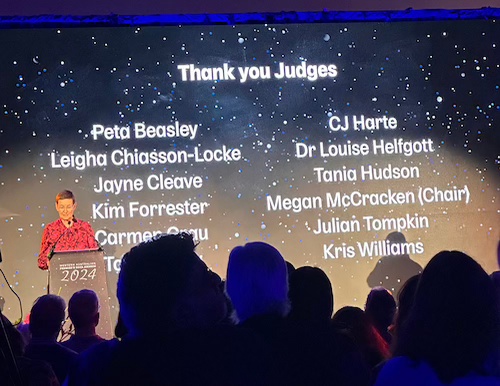
I finally got my name up in lights! LOL.
^^ Now you know why my Year with John Banville schedule went a little off track! And why book reviews have been a little thin on the ground lately.



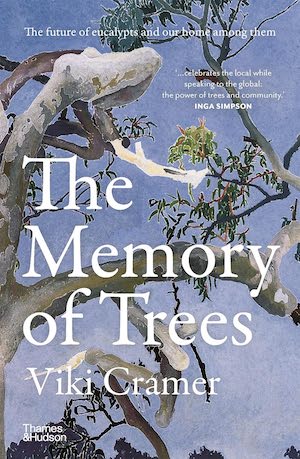


Oh, what a wonderful (and well deserved!) experience for you, if a little gruelling at times. It must be tough evaluating fairly such a large number – and variety – of books. It looks as though there are some real goodies here. I wonder how many will end up on the British market? I haven’t checked yet, but I will, because the notes you include make the winners look appetising indeed. Now, are you planning on having a good long rest?
LikeLike
It was certainly an intense exercise! The Daisley has been published in the UK and I think Operation Hurricane has, too.
No rest for me, I’m afraid. I changed jobs in early May and I’ve joined a new organisation at the height of its busiest period of the year, so it’s never dull around here!
LikeLiked by 1 person
Courage! (Best said in a French accent)
LikeLike
😀
LikeLiked by 1 person
As I said on Instagram, well done Kimbofo. It’s a huge task that I couldn’t possibly take on and I so admire anyone who does. I bet it was a good experience and I hope you had fun with your co-judges.
I have Kinsellas’s verse novel on my TBR but would now also like to reads Daisley’s.
LikeLike
It was a great experience and despite the intensity of it, I would put up my hand and do it again! I loved the Daisley and the Kinsella…. such wonderful reads!
LikeLiked by 1 person
Good for you! I can imagine it being a good experience!
LikeLiked by 1 person
How exciting! Big well done, what a great project to be involved in
LikeLike
Thank you. It was a fantastic experience.
LikeLiked by 1 person
Congratulations, Kim, I’ve read (and reviewed) both Cellnight and A Better Place and while I think they were both great books, I am pleased to see long-overdue recognition for a book that is so honest about warfare when there is so much sanitised WW2 popular fiction around. It is a tough read, you can tell that I was overwhelmed from my review, but very powerful. Daisley has grown in stature since I first started reading him: Traitor and Coming Rain showed him taking on tough topics too, but we need writers to do just that.
I only have a slight inkling of how gruelling the last months have been for you, but on behalf of readers from all over Australia who benefit from your expertise, I say thank you:)
Lisa x
LikeLike
Thank you for your lovely comment, Lisa. The judging process was fun, if occasionally time pressured (my poor eyes!), it was the other “life stuff” that got in the way and made the past couple of months challenging. It’s all good now, though, and I’m chuffed I can start to publish a few reviews of the contenders as I took copious notes as part of the judging process!
Stephen Daisley’s novel will live with me for a long time, I think. It’s great to hear you have read his earlier work and rate it. I will definitely be hunting it out.
LikeLiked by 1 person
That was a marathon task reading all of that literature. Thanks for introducing an Irish reader to a diverse range of Australian books and writers. We might see some of the books in Irish bookshops. Interesting to see the name John Kinnsella…a very Irish surname.
LikeLike
There’s a lot of Kinsella’s in this part of the world… just as there are lots of Irish people 🙂
I think the Daisley should be available on your side of the world as it was longlisted for the Walter Scott Historical Prize a few months back.
LikeLike
Being a judge for an award sounds like an impossible job to me. Exciting to read what should be a preselection of the best books, but it takes the pressure of the TBR to the next level. I’m also intrigued by the category of unpublished indigenous writing. Does the winner get a guarantee of publication?
LikeLike
The indigenous writing category was managed by the wonderful Magabala Books, an indigenous publishing company. The winner gets $15,000 and a publishing contract.
LikeLike
$15,000 sounds like an incredibly large amount of money, but then I remember it’s AUS and realise it’s less than it sounds (about €9,100 or £7,800), but still a considerable prize. Plus the joy of seeing your writing published. Brilliant!
LikeLike
OH WOW! What an amazing experience Kim – what I want to know is how did you manage any other reading during that time?! Or work for that matter?
LikeLike
I didn’t manage any other reading! I spent every spare moment on weekends and every evening reading the submissions. It was a very intense 5 weeks or so, whittling the 60+ books down to a manageable shortlist with my fellow judges.
LikeLiked by 1 person
Dude!! What a fantastic gig! Congratulations on getting it all done, and what a good winner. I think it was listed for the Walter Scott Prize for Historical Fiction as well.
LikeLike
Hi Elle, It was shortlisted for the NZ Ockhams as well and was unlucky to be among such strong contenders as Lioness by Emily Perkins (the winner), Birnam Wood by Eleanor Catton and Audition by Pip Adam.
LikeLiked by 1 person
Ah yes, I’d forgotten it was longlisted for the Walter Scott Prize. (It didn’t make the shortlist.)
LikeLiked by 1 person
Congratulations on being chosen. It really is time a) I read some more Kinsella; b) caught up on leading edge WA fiction.
I was going to say what happened to Triple Choice Tues? But it’s in the name isn’t. Did you press the Go button too early?
LikeLike
Oh god, did the Triple Choice Tuesday go live? I scheduled it for Tuesday and then got pingbacks for two posts, which totally did not make sense because that usually doesn’t happen until the post is published. I think WP might have had some glitches this morning…
LikeLiked by 1 person
Fantastic Kim, what a brilliant experience!
LikeLike
It was indeed!
LikeLiked by 1 person
So cool — congratulations, Kim! I’m always intrigued by cross-genre prize lists, but wonder however the judges even begin to compare books that are so different from each other. It must have been a thrill when those boxes arrived for you … but then probably a slog somewhere at the midpoint? The Memory of Trees appeals to me.
I’ve been a manuscript judge for the McKitterick Prize (run by the Society of Authors) for the past three years, but that involves reading PDF/Word documents of unpublished novels — I hope one day I’ll be able to assess ‘proper books’ for a prize.
LikeLike
We had a list of criteria to judge against, regardless of genre etc, but yes, it’s difficult comparing apples with oranges, but you’ll note that the shortlist actually has three nonfiction titles on it — and they were all superb!
Assessing manuscripts is hard… the Fellowship category had applications — CVs, letters of recommendation, the project proposal/costings, 40-pages of writing AND a book — which was intense, but because that was my secondary judging category the shortlist had already been created, so it wasn’t as onerous as it might sound.
Would love to do it all again at some point, but for now I’m looking forward to reading books by authors outside of WA for a little bit!
LikeLiked by 1 person
Fascinating and well done for getting through all those books!
LikeLike
Thanks. You will notice a flurry of WA books being reviewed here over next few weeks… the shortlisted titles and those that didn’t make the cut but were enjoyable nonetheless
LikeLiked by 1 person